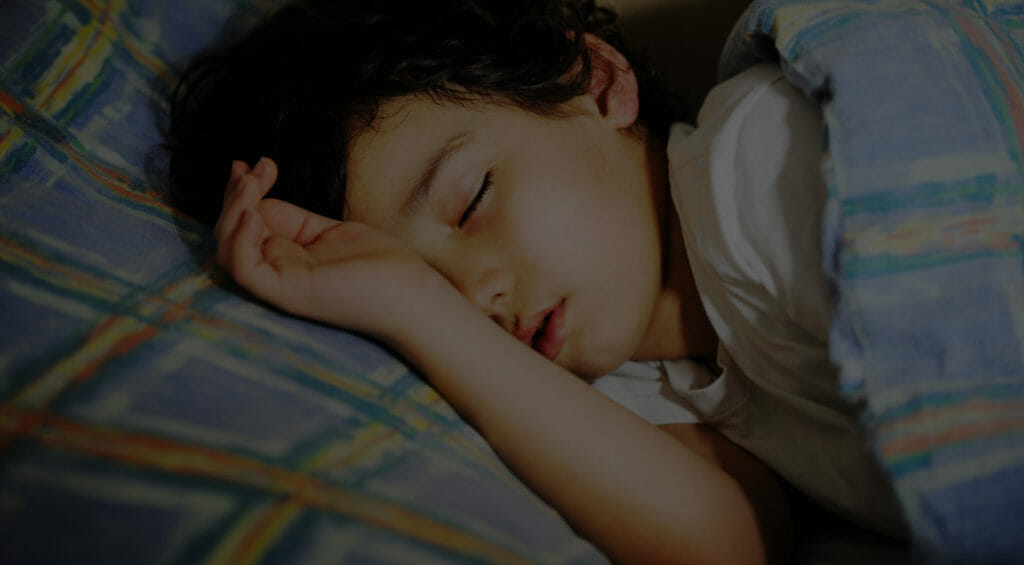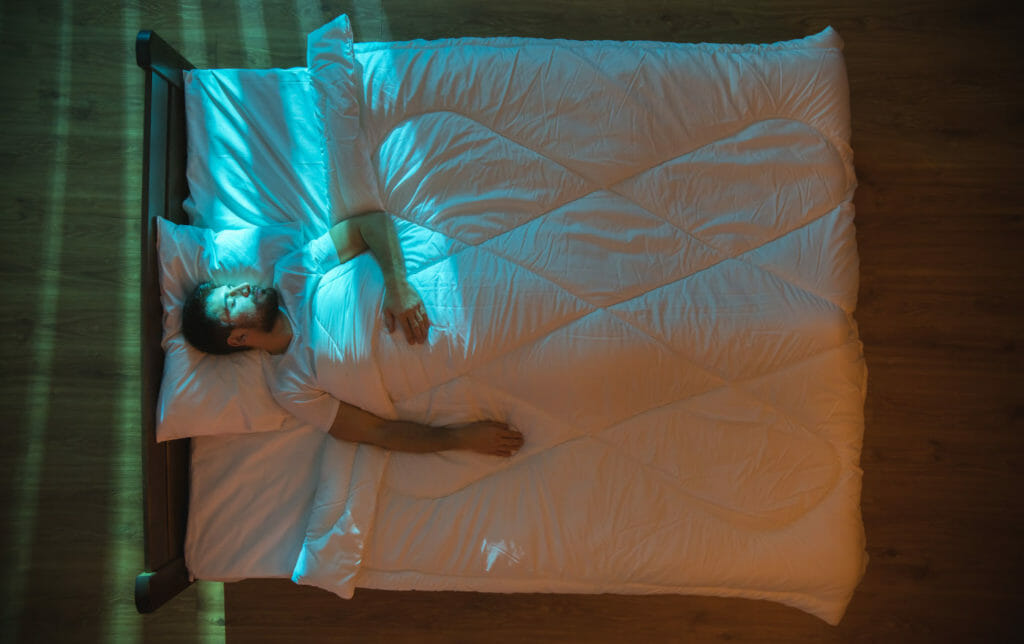
Are you concerned that you talk in your sleep? Perhaps someone told you that you mumbled some incomprehensible gibberish during the night. Or that you burst out laughing, engaged in a several-minute-long monologue, or even screamed out loud! Yikes! Maybe you have a child who frequently talks while sleeping?
Is talking in your sleep dangerous or bad? Or is it normal, nothing to worry about, and something most of us do? This article looks at the various reasons people talk in their sleep, as well as offers suggestions to relieve sleep talking embarrassment and/or other worries.
What Actually is Sleep Talking?
According to the National Sleep Foundation, sleep talking is a sleep disorder classified as a parasomnia and is defined as one talking during sleep without being aware. Talking in your sleep can occur at any point during the night. In lighter sleep stages, your sleep chatter may be clearer, more sensical, and lengthy; in deep sleep, talking may be a cry out, a moan, or gibberish.
Except for getting feedback from a bed partner or roommate, many of us have no clue that we may occasionally (or frequently) talk in our sleep.
Who Talks in Their Sleep?

Sleep talking seems to run in families. Consequently, there are those of us who are more likely predisposed to chatting while asleep than others. Despite the possible genetic connection, the vast majority of people have, at some point in their lives, talked while getting their ZZZs.
Generally speaking, about half of all children between 3 and 10 years old talk or make sounds in their sleep several nights a week. Among sleep-talking kids, there seems to be no gender-related prevalence. Both boys and girls talk while sleeping. As these children get older, they usually talk far less in their sleep.
Among adults who engage in sleep talking, the majority are men. And, while half of all children talk in their sleep, only about 5% of adults sleep talk regularly. Two-thirds of all adults, though, say something while sleeping several times a year.
Does Talking in Your Sleep Mean You’re Having a Nightmare?
It very well could be that while having a bad dream, a child or adult might talk or cry out in their sleep. However, nightmares aren’t the only instance when this happens. According to the Alaska Sleep Clinic, other parasomnias that may coexist with sleep talking include:
Night Terrors: These events are similar to nightmares, but they occur before the REM dream state and involve extremely intense feelings of fear that are typically not remembered upon waking. (We usually remember a bad dream.)
Sleepwalking: While walking in your sleep, someone might ask you a question to which you may respond.
Nocturnal Sleep-Related Eating Disorder: Walking, binge eating, and talking may all occur at the same time while you’re sound asleep.
Confusional Arousals: You wake up, or at least seem to be awake, yet your behavior is strange and may involve sleep talking.
Obstructive Sleep Apnea Syndrome: Snoring and stopped breathing while sleeping could be a symptom of sleep talking.
REM Sleep Behavior Disorder: People with RSBD yell, shout, and act out their dreams—often violently.
Psychiatric Disorders: In rare cases, adult-onset of frequent sleep talking is associated with mental illness or nocturnal seizures.
What Other Factors May Induce Sleep Talking?

For the children and adults who experience frequent sleep talking, as well as for the rest of us who occasionally talk in our sleep, the following factors can contribute to our nighttime utterances:
- Chronic fatigue
- Sleep deprivation
- Inconsistent bedtimes
- Stress
- Depression
- Fever
- Certain medications
- Substance abuse
- Caffeine
- Alcohol
Consistent sleep and wellness rituals such as having a regular wake-up/bedtime schedule and getting sufficient sleep seem to quiet sleep chatter.
Is Sleep Talking Dangerous?
Sleep talking is harmless, for the most part. There are some circumstances, however, when it can become detrimental to the person talking in their sleep. Moreover, parents and bed partners who witness their loved ones sleep talking may suffer from interrupted sleep and general concern.
The first negative consideration is that being told you’ve said something in your sleep can feel embarrassing and down-right nerve racking. According to an article in the Washington Post, some people swear and say “nasty things” in their sleep. Concern, shame, or guilt regarding these instances can lead to insomnia and other challenges.
While there is the consolation that the things we say while sleeping usually cannot incriminate us in court, that doesn’t fully negate the “What did I say in my sleep?” worry factor.
Another consideration is that nighttime sleep chatter or sounds can cause sleep disturbance for a bed partner or roommate. In particular, if someone speaks loudly or yells out in their sleep, it can be very jarring and make falling back to sleep a challenge for the other person.
What Can You Do to Stop Talking in Your Sleep?

Usually, treatment for talking in your sleep isn’t necessary, because it happens infrequently and is a short-term issue. However, if your sleep talking persists and becomes embarrassing for you or problematic for anyone around you, consider taking the following measures (as applicable):
- Restrict your alcohol, caffeine, and nicotine consumption
- Establish and follow consistent bed and wake-up times
- Get 7 to 9 hours of restorative sleep nightly
- Engage in stress reduction techniques
- Enter treatment for substance abuse
- Talk to your pharmacist about the side effects of all the medications you are taking
- Speak to a mental health specialist for anxiety or depression
- Encourage your partner to wear ear plugs or use white noise to drown out any nighttime chatter
Should You See a Doctor if You Talk in Your Sleep?
Not usually, but it depends. Should your sleep talking be accompanied by stressful nighttime events such as thrashing body movements, fear, sweating, or anything else that is long-lasting and beyond a little embarrassment, don’t hesitate to see a physician or sleep specialist immediately. There may be an underlying condition related to this parasomnia that requires diagnosing and professional care.
The Bottom Line
Of the various parasomnias out there, sleep talking has perhaps the least egregious impact on our sleep and health. Why it happens, though, is not entirely understood. It occurs most frequently in children and men, and there appears to be a family connection.
For the almost 50% of children and 5% of adults who regularly talk in their sleep, there can be both physical and emotional challenges. In those instances, seeking out the care of a physician or sleep specialist is warranted.
If lack of quality sleep is aggravating your child’s sleep-talking, take these sleep tips into account and consider purchasing them a higher-quality mattress.
For the rest of us who engage in sporadic sleep talking, relax. The majority of adults talk in their sleep here and there and still wake up feeling refreshed. If your bed partner or roommate complain about your occasional nighttime banter, a pair of ear plugs or a white noise device can assist in muffling the disturbing sleep sounds.
If you’re unhappy about talking in your sleep, healthy sleep habit maintenance, including getting a sufficient number of hours of sleep on a comfortable mattress, may just lull you to quieter nights of sleep.